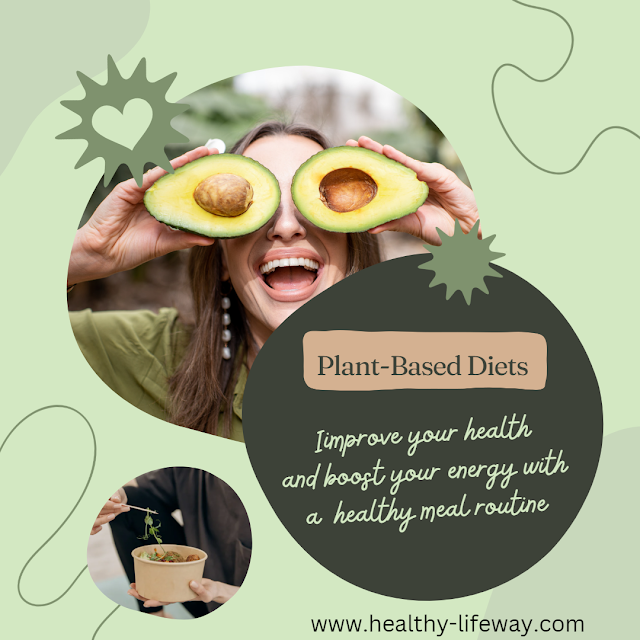Plant-Based Diets
 |
| Plant-Based Diets |
Plant-Based Diets
Exploring the Benefits and Considerations of Vegetarian or Vegan Eating Patterns
Introduction:
Plant-based diets, including vegetarian and vegan eating patterns, have gained significant popularity in recent years. These dietary choices prioritize plant-derived foods while minimizing or eliminating animal products. Plant-based diets offer numerous health benefits, promote environmental sustainability, and align with ethical considerations. In this article, we will delve into the advantages and considerations of adopting a plant-based eating pattern.
Health Benefits of Plant-Based Diets:
1. Lower Risk of Chronic Diseases:
Plant-based diets have been associated with a reduced risk of chronic conditions such as heart disease, type 2 diabetes, and certain cancers. The emphasis on fruits, vegetables, whole grains, legumes, and nuts provides essential nutrients, fiber, and phytochemicals that contribute to overall health.
2. Weight Management:
Plant-based diets tend to be lower in calories and saturated fats while being rich in fiber, promoting healthy weight management. The abundance of nutrient-dense plant foods can help individuals feel satisfied while maintaining a healthy body weight.
3. Improved Digestive Health:
Plant-based diets, particularly those rich in fiber from fruits, vegetables, and whole grains, support a healthy digestive system. Adequate fiber intake aids in regular bowel movements, promotes gut health, and may reduce the risk of conditions like constipation, diverticulitis, and colorectal cancer.
Environmental Considerations:
1. Reduced Carbon Footprint:
Animal agriculture contributes significantly to greenhouse gas emissions and deforestation. Choosing plant-based diets helps reduce the carbon footprint and minimize environmental impact, making it an environmentally sustainable choice.
2. Conservation of Resources:
Producing animal-based foods requires vast amounts of water, land, and energy resources. Plant-based diets use fewer resources, conserving water, reducing land usage, and easing the strain on energy demands.
Considerations and Tips:
1. Nutrient Considerations:
While plant-based diets can provide all essential nutrients, it's important to ensure an adequate intake of certain nutrients like vitamin B12, iron, zinc, and omega-3 fatty acids. Fortified foods or supplements may be necessary to meet these needs, especially for vegans.
2. Meal Planning:
Planning balanced meals that include a variety of plant-based proteins (e.g., legumes, tofu, tempeh), whole grains, fruits, vegetables, and healthy fats is key to obtaining a diverse range of nutrients. Experimenting with new recipes and flavors can make the transition to a plant-based diet more enjoyable.
3. Seek Professional Guidance:
If you're considering a plant-based diet, consulting a registered dietitian or healthcare professional can provide personalized guidance and ensure nutritional needs are met, especially if you have specific dietary requirements or medical conditions.
The Social and Ethical Considerations: Beyond the health and environmental benefits, plant-based diets also align with ethical and social considerations. Many individuals choose plant-based eating patterns due to concerns about animal welfare and the ethical implications of animal agriculture. By opting for plant-based foods, individuals can contribute to reducing the demand for animal products and support more compassionate and sustainable food systems.
Tips for Transitioning to a Plant-Based Diet:
Transitioning to a plant-based diet can be a gradual process. Here are some helpful tips to make the transition smoother:
1. Start Slowly:
Begin by incorporating more plant-based meals into your routine. Start with one or two meatless days per week and gradually increase the number of plant-based meals.
2. Experiment with Flavors and Recipes:
Explore a variety of plant-based recipes and experiment with different flavors and cooking techniques. This can make the transition more exciting and enjoyable.
3. Focus on Whole Foods:
Emphasize whole, unprocessed plant foods such as fruits, vegetables, legumes, whole grains, nuts, and seeds. These foods provide a wide range of nutrients and contribute to overall health.
4. Learn about Plant-Based Protein Sources:
Plant-based proteins like legumes, tofu, tempeh, seitan, and edamame can be excellent alternatives to animal-based proteins. Incorporate these protein sources into your meals to meet your daily protein needs.
5. Educate Yourself:
Read books, watch documentaries, and explore online resources that provide information about plant-based nutrition, meal planning, and cooking techniques. This knowledge can empower you to make informed choices and ensure a well-rounded plant-based diet.
6. Connect with the Plant-Based Community:
Join online forums, social media groups, or local community groups that focus on plant-based eating. Engaging with like-minded individuals can provide support, inspiration, and helpful tips along your plant-based journey.
Conclusion:
Embracing a plant-based diet is a personal choice that can have significant health, environmental, and ethical implications. By understanding the benefits, considering the environmental impact, and making informed choices, you can embark on a plant-based eating pattern that aligns with your values and promotes your well-being.







Post a Comment